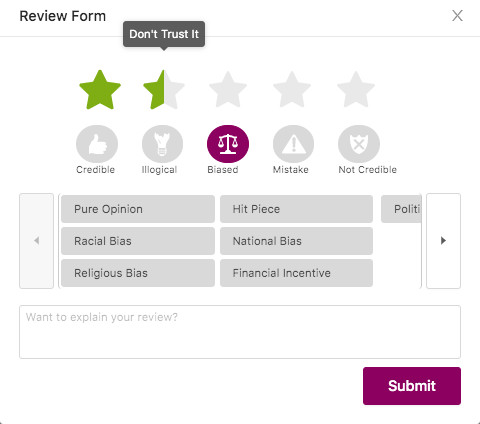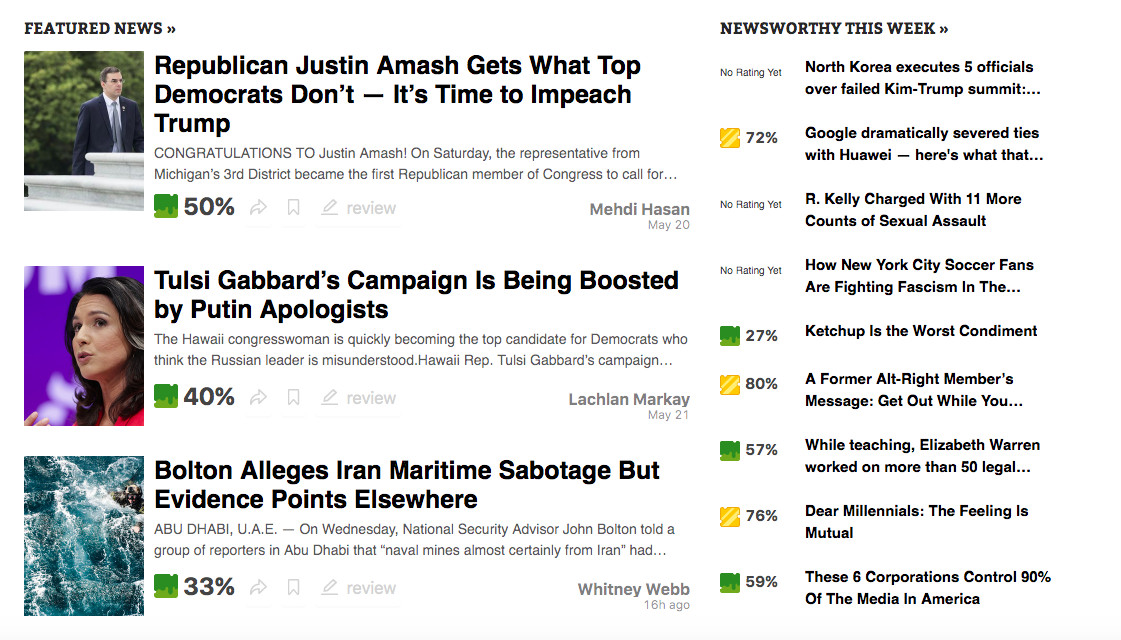As Facebook and Twitter grapple with misinformation and conspiracies on their platforms, a new crop of startups have emerged to try and use Yelp-like ratings to identify and amplify trusted stories.
These user-powered sites include Our.News and TrustedNews. Last year, even Elon Musk pitched the idea of creating a site he called “Pravda”—a media credibility site for ranking journalists and outlets.
Going to create a site where the public can rate the core truth of any article & track the credibility score over time of each journalist, editor & publication. Thinking of calling it Pravda …
— Elon Musk (@elonmusk) May 23, 2018
Credder (they “dish out credibility”)—which launched its public-facing beta on Monday—is perhaps the most developed. “We were the first ones here,” co-founder Chase Palmieri says. And they did start thinking about this idea before the 2016 election, when fake news became more of an issue. “Pravda was an idea on Twitter, that’s all it’s been. Elon is a pretty busy guy.”
The Credder team wants to provide readers a solution to clickbait and sensationalism that “doesn’t involve outsourcing their critical thinking” to an algorithm or another person—like a Facebook moderator. They say that having news outlets and social media platforms censor untrustworthy content on readers’ behalf strikes them as fairly draconian.
When Palmieri and his two co-founders Austin Walter and Jared Fesler graduated from California State University, Chico, they knew they wanted to start a business, but didn’t know what kind. They kept in touch, pitched each other on ideas, and worked other jobs.
Palmieri moved to Italy, but also continued to own a restaurant back in Petaluma, where he managed its Yelp page from abroad. He liked the way the reviews got him to change his business’s behavior. At the end of 2015, alarmed by the “rising amount of clickbait,” they set about making a product to evaluate the “trustworthiness” of news articles in a similar way. They want news producers to “compete for trust, not clicks”—and aspire to help drive traffic and revenue “to the people who are winning that game.” Their first adviser was Patrick Lee, the co-founder and former CEO of Rotten Tomatoes. Instead of a tomato icon, Credder uses a picture of cheddar cheese. (Golden cheese for most trustworthy, moldy cheese for least.)
Users assess individual articles by ranking them between one star, for least trustworthy, and five stars for most. The next step is to decide whether an article was “credible”, “illogical”, “biased”, a “mistake” or “not credible.” Each of those five then has additional options. “Biased” prompts new choices like “Hit Piece,” “Religious Bias,” or “Financial Incentive.” Users then can explain their review in a text box before submitting.
The co-founders wanted it to be more nuanced than a five-star rating system, but still convenient enough that people would actually use it. Like Rotten Tomatoes, you can read reviews both by the general public and by professional journalists.
Unlike Yelp, where restaurants are reviewed, but not individual dishes, Credder users rate articles, not the outlet as a whole. But outlets and journalists are then also given their own composite scores.
Credder’s founders hope journalists will use the reviews to inform their writing, and be motivated to increase their trust score. If a journalist gets feedback that their headlines are too sensational, and their editor won’t change their practice, well, Palmieri says, “maybe the journalist might think about working for a different outlet.” He also hopes Credder will “protect, empower and connect news consumers on the go” by providing a way to warn each other about stories they should avoid or approach cautiously. Right now, they say, news consumers have little recourse to hold an outlet or reporter accountable for low-quality content.
As of last Friday, 2,619 users had created accounts on Credder, and 41 journalists. The co-founders expect distribution to be their biggest challenge.
But even if the idea takes off, it remains to be seen whether journalists will care about the feedback they get. As a writer often in progressive outlets, how would I know that people who rank my articles as untrustworthy aren’t just right-wing diehards looking to professionally damage journalists they blame for left-wing politics? After all, much of the erosion of trust in the media is rooted in partisanship; Democrats see most news as unbiased, while Republicans believe the opposite. And while trust in media is still down from earlier decades, it’s been making a comeback since it hit an all-time low in 2016.
Credder hopes to have a solution for this, too. It wants to hold reviewers accountable, allowing people to up-vote or down-vote reviews based on how helpful they found them, like comments on Reddit. And you can see when a user joined the site, how many reviews they’ve left in total, and how many of their reviews were up-voted as helpful.
Credder hopes to entice journalists to spend their time reviewing fellow journalists, too, by offering additional exposure and new audiences. More intriguing, however, Credder is planning to add a tipping feature, so readers could reward trustworthy writers, either one-time or on a recurring basis.
Another issue, as the editor of Monday Note, Frederic Filloux, pointed out, is that the number of movies and TV shows released last year in the United States is dwarfed by the number of news articles, making the comparison to Rotten Tomatoes somewhat distorted. The sheer number of reviews required to comprehensively evaluate the news is just a considerable challenge. Credder estimates they’ll need about 10,000 people to review an article every day, in order to get enough feedback to accurately rate most of the news produced from the world’s top 70 outlets.
The co-founders argue that journalists don’t really have meaningful ways to learn how individual articles were received. Reporters can look at the number of clicks, shares, time spent reading an article, and monthly site visits as a way to quantify success — but these are admittedly imperfect measures. And of course, people who respond to an article directly are disproportionately people who loved or hated it.
Still, as comforting as it is to think that a new tech tool may be just what readers need to navigate a confusing and deliberately misleading news environment, I can’t help but think of the doctored video of Nancy Pelosi slurring her words that Donald Trump circulated last week and Facebook refused to take down. As a top Facebook official put it, they wanted to empower users “to make their own informed choice about what to believe.”
There are no articles on Credder about that incident, and given the site’s infancy, it’s hard to know how that would have been assessed. But as New York Times tech columnist Charlie Warzel recently noted, “whether repeating the lie or attempting to knock it down, the dominant political narrative” for days after focused squarely on Pelosi’s health. No amount of fact checkers, negative Credder ratings, or “dislikes” can really counteract that millions of people have now seen the viral Pelosi hoax, and consciously or not, embedded those images in their brains.
Which is to say, welcome Credder, it’ll be interesting to see where you go and how you grow. But to combat the powerful lies flooding the internet and shaping our discourse, titans like Facebook should still take responsibility.
Rachel Cohen is a freelance journalist based in Washington D.C. Follow her on Twitter @rmc031.




